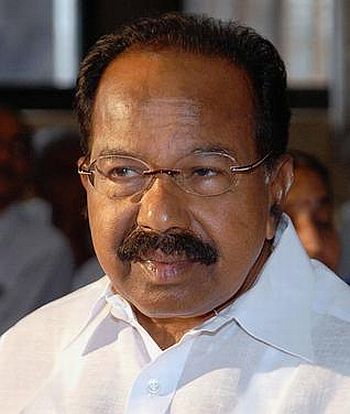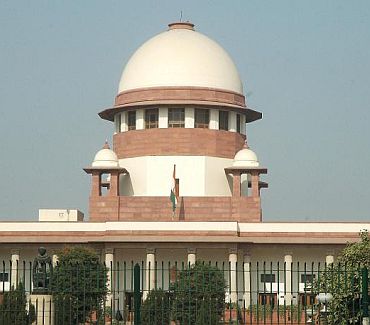
Struggling to bring down the whopping over 3 crore pending court cases in the country, the Law Ministry proposes to soon place before the Union Cabinet a comprehensive National Litigation Policy which aims at disposing of cases within three years.
The proposed policy aims at reducing government litigation, which forms a substantial chunk of pending cases.
"The proposed Litigation Policy will soon be before the Union Cabinet for its approval. We have received feedback from other ministries, including the Finance Ministry," Law Minister M Veerappa said in New Delhi.

"I will take all proactive steps to reduce the delays," Moily said.
The policy also ensures that bad cases are not needlessly pursued while good cases are won.
Several thousands of cases are pending in courts where government employees, both serving and retired, have challenged decisions of their departments with regard to promotions and benefits.
There is another set of cases where the common man has made government departments like PWD, DDA and police parties in their litigations.
In 2011, the government also proposes to bring a Right to Justice Bill on the lines of Right to Education Act to ensure the right to justice is not denied to the common man.

After several rounds of deliberations and much talk, the Law Ministry last year brought before the Cabinet the Judicial Standards and Accountability Bill, 2010.
Due to sharp differences within the Cabinet, the Bill was referred to a Group of Ministers. After getting its nod, the Bill was cleared by the Cabinet in October and introduced in the Lok Sabha in the just held Winter Session.
According to the Bill, which is likely to be referred to a Standing Committee of Parliament, judges of the Supreme Court and high courts would be subject to scrutiny of a high-level committee and those facing serious charges of misconduct may be asked to step down.

The much-delayed Bill provides for setting up of a five-member Oversight Committee to be headed by a former Chief Justice of India and including the Attorney General to go into complaints against members of the higher judiciary.
In 2009, the Law Ministry had received a major setback during the Monsoon Session of Parliament when Moily was forced to defer tabling the Judges Assets Bill in the Rajya Sabha as the combined Opposition -- and some Congress members -- objected to a particular clause that while judges will declare their assets, the same could not be put in public domain.
Moily had then assured to evolve a political consensus on the issue and bring out a comprehensive bill on judicial reforms.